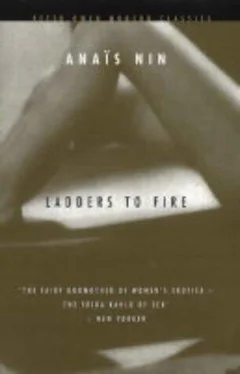Anaïs Nin - Ladders to Fire
Здесь есть возможность читать онлайн «Anaïs Nin - Ladders to Fire» весь текст электронной книги совершенно бесплатно (целиком полную версию без сокращений). В некоторых случаях можно слушать аудио, скачать через торрент в формате fb2 и присутствует краткое содержание. Год выпуска: 2004, ISBN: 2004, Издательство: Peter Owen Limited, Жанр: Классическая проза, Эротические любовные романы, на английском языке. Описание произведения, (предисловие) а так же отзывы посетителей доступны на портале библиотеки ЛибКат.
- Название:Ladders to Fire
- Автор:
- Издательство:Peter Owen Limited
- Жанр:
- Год:2004
- ISBN:9780720611625
- Рейтинг книги:5 / 5. Голосов: 1
-
Избранное:Добавить в избранное
- Отзывы:
-
Ваша оценка:
- 100
- 1
- 2
- 3
- 4
- 5
Ladders to Fire: краткое содержание, описание и аннотация
Предлагаем к чтению аннотацию, описание, краткое содержание или предисловие (зависит от того, что написал сам автор книги «Ladders to Fire»). Если вы не нашли необходимую информацию о книге — напишите в комментариях, мы постараемся отыскать её.
Cities of the Interior
Children of the Albatross
The Four-Chambered Heart
A Spy in the House of Love
Solar Barque
Ladders to Fire — читать онлайн бесплатно полную книгу (весь текст) целиком
Ниже представлен текст книги, разбитый по страницам. Система сохранения места последней прочитанной страницы, позволяет с удобством читать онлайн бесплатно книгу «Ladders to Fire», без необходимости каждый раз заново искать на чём Вы остановились. Поставьте закладку, и сможете в любой момент перейти на страницу, на которой закончили чтение.
Интервал:
Закладка:
And suddenly in this balcony, she felt alone.
Her cape, which was more than a cape, which was a sail, which was the feelings she threw to the four winds to be swelled and swept by the wind in motion, lay becalmed.
Her dress was becalmed.
It was as if now she wore nothing that the wind could catch, swell and propel.
For Sabina, to be becalmed meant to die.
Jealousy had entered her body and refused to run through it like sand through an hourglass. The silvery holes of her sieve against sorrow granted her at birth through which everything passed through and out painlessly, had clogged. Now the pain had lodged itself inside of her.
She had lost herself somewhere along the frontier between her inventions, her stories, her fantasies, and her true self. The boundaries had become effaced, the tracks lost, she had walked into pure chaos, and not a chaos which carried her like the wild gallopings of romantic riders in operas and legends, but a cavalcade which suddenly revealed the stage prop: a papier-mache horse.
She had lost her boat, her sails, her cape, her horse, her seven-league boots, and all of them at once, leaving her stranded on a balcony, among dwarfed trees, diminished clouds, a miserly rainfall.
In the semi-darkness of that winter evening, her eyes were blurred. And then as if all the energy and warmth had been drawn inward for the first time, killing the senses, the ears, the touch, the palate, all movements of the body, all its external ways of communicating with the exterior, she suddenly felt a little deaf, a little blind, a little paralyzed; as if life, in coiling upon itself into a smaller, slower inward rhythm, were thinning her blood.
She shivered, with the same tremor as the leaves, feeling for the first time some small withered leaves of her being detaching themselves.
The Chess Player placed two people on a square.
As they danced a magnet pulled her hair and his together, and when they pulled their heads away, the magnet pulled their mouths together and when they separated the mouths, the magnet clasped their hands together and when they unclasped the hnds their hips were soldered. There was no escape. When they stood completely apart then her voice spiraled around his, and his eyes were caught in the net grillage which barred her breasts.
They danced off the square and walked into a balcony. Mouth meeting mouth, and pleasure striking like a gong, once, twice, thrice, like the beating wings of large birds. The bodies traversed by a rainbow of pleasure.
By the mouth they flowed into each other, and the little grey street ceased to be an impasse in Montparnasse. The balcony was now suspended over the Mediterranean, the Aegean Sea, the Italian lakes, and through the mouth they flowed and coursed through the world.
While on the wall of the studio there continued to hang a large painting of a desert in smoke colors, a desert which parched the throat. Imbedded in the sand many little bleached bones of lovelessness.
“The encounter of two is pure, in two there is some hope of truth,” said the Chess Player catching the long floating hair of Stella as she passed and confronting her with a potential lover.
Behind Stella hangs a painting of a woman with a white halo around her head. Anxiety had carved diamond holes through her body and her airiness came from this punctured faith through which serenity had flown out.
What Stella gave now was only little pieces of herself, pieces carefully painted in the form of black circles of wit, squares of yellow politeness, triangles of blue friendliness, or the mock orange of love: desire. Only little pieces from her external armor. What she gave now was a self which a man could only carry across the threshold of an abstract house with only one window on the street and this street a desert with little white bones bleaching in the sun.
Deserts of mistrust.
The houses are no longer hearths; they hang like mobiles turning to the changing breeze while they love each other like ice skaters on the top layers of their invented selves, blinded with the dust of attic memories, within the windowless houses of their fears.
The guests hang their coats upon a fragile structure like the bar upon which ballet dancers test their limb’s wit.
The Party spreads like an uneasy octopus that can no longer draw in his tentacles to seize and strangle the core of its destructiveness.
In each studio there is a human being dressed in the full regalia of his myth fearing to expose a vulnerable opening, spreading not his charms but his defenses, plotting to disrobe, somewhere along the night—his body without the aperture of the heart or his heart with a door closed to his body. Thus keeping one compartment for refuge, one uninvaded cell.
And if you feel a little compressed, a little cramped in your daily world, you can take a walk through a Chirico painting. The houses have only facades, so escape is assured; the colonnades, the volutes, valances extend into the future and you can walk into space.
The painterspeopled the world with a new variety of fruit and tree to surprise you with the bitterness of what was known for its sweetness and the sweetness of what was known for its bitterness, for they all deny the world as it is and take you back to the settings and scenes of your dreams. You slip out of a Party into the past or the future.
This meandering led the Chess Player to stray from his geometrical duties, and he was not able to prevent a suicide. It was Lillian who stood alone on a square; Lillian who had begun the evening like an African dancer donning not only all of her Mexican silver jewelry but a dress of emerald green of a starched material which had a bristling quality like her mood.
She had moved from one to another with gestures of her hands inciting others to foam, to dance. She teased them out of their nonchalance or detachment. People would awaken from their lethargies as in a thunderstorm; stand, move, ignite, catching her motions, her hands beating a meringue of voices, a souffle of excitement. When they were ready to follow her into some kind of tribal dance, she left them, to fall again into limpness or to walk behind her enslaved, seeking another electrical charge.
She could not even wait for the end of the Party to commit her daily act of destruction. So she stood alone in her square defended by her own bristles and began: “No one is paying any attention to me. I should not have worn this green dress: it’s too loud. I’ve just said the wrong thing to Brancusi. All these people have accomplished something and I have not. They put me in a panic. They are all so strong and so sure of themselves. I feel exactly as I did in my dream last night: I had been asked to play at a concert. There were so many people. When I went to play, the piano had no notes, it was a lake, and I tried to play on the water and no sound came. I felt defeated and humiliated. I hate the way my hair gets wild. Look at Stella’s hair so smooth and clinging to her face. Why did I tease her? She looked so tremulous, so frightened, as if pleading not to be hurt. Why do I rush and speak before thinking? My dress is too short.”
In this invisible hara-kiri she tore off her dress, her jewels, tore off every word she had uttered, every smile, every act of the evening. She was ashamed of her talk, of her silences, of what she had given, and of what she had not given, to have confided and not to have confided.
And now it was done. A complete house-wrecking service. Every word, smile, act, silver jewel, lying on the floor, with the emerald green dress, and even Djuna’s image of Lillian to which she had often turned for comfort, that too lay shattered on the ground. Nothing to salvage. A mere pile of flaws. A little pile of ashes from a bonfire of self-criticism.
The Chess Player saw a woman crumpling down on a couch as if her inner frame had collapsed, smiled at her drunkenness and took no note of the internal suicide.
Читать дальшеИнтервал:
Закладка:
Похожие книги на «Ladders to Fire»
Представляем Вашему вниманию похожие книги на «Ladders to Fire» списком для выбора. Мы отобрали схожую по названию и смыслу литературу в надежде предоставить читателям больше вариантов отыскать новые, интересные, ещё непрочитанные произведения.
Обсуждение, отзывы о книге «Ladders to Fire» и просто собственные мнения читателей. Оставьте ваши комментарии, напишите, что Вы думаете о произведении, его смысле или главных героях. Укажите что конкретно понравилось, а что нет, и почему Вы так считаете.












